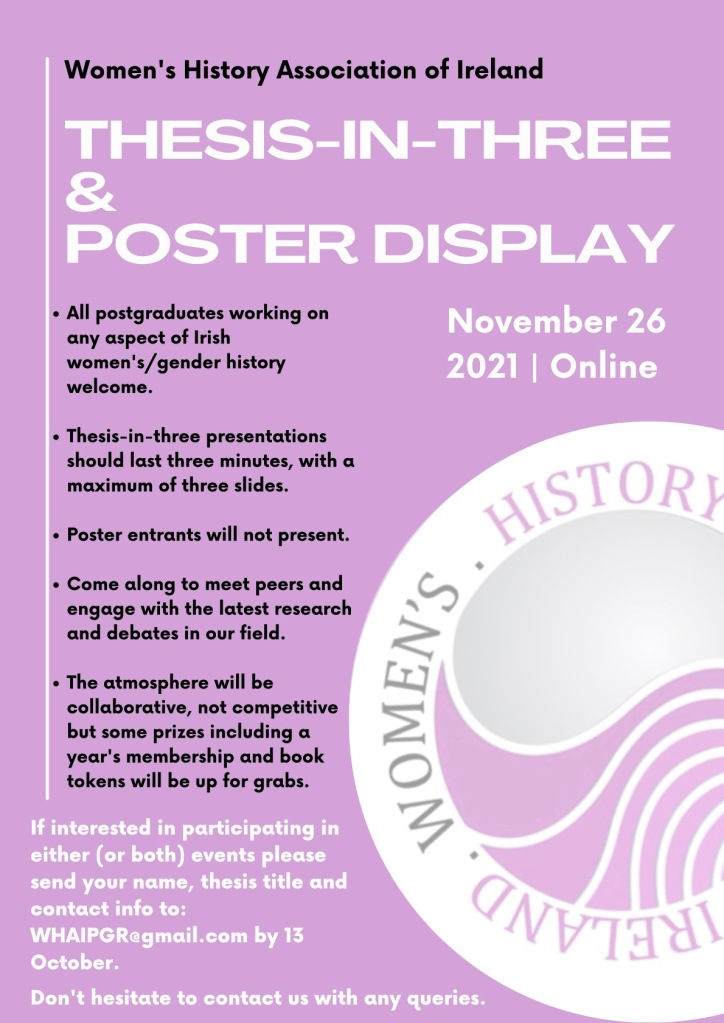The 32nd Irish Conference of Historians took place in University College Cork from 26 – 28 April. The theme of this year’s conference ‘Sex, Sexuality andReproduction’ was one which was propitious and opportune as the country surged towards a momentous and historic referendum on the Repeal of the Eighth Amendment. As my taxi pulled up outside of UCC, the driver asked me what conference I was attending. When I told him the title I think he nearly blushed! “Oh!” was his response.
What was particularly memorable about this conference was the wide range of themes. Over the three dayperiod, topics from 1960’s sex advice and pornography, to motherhood and breastfeeding were presented.
The unlimited timeframe allowed for a conference for both early and modern historians alike. There was fascinating keynote presentation from Ruth Karras exploring the ‘myth of masculine impurity’ in the Middle Ages followed by panels focusing on sex and sexuality in medieval and early modern history. Other panels included nineteenth century midwifery, marriage and marital status, and religion and repression. The panel on sex and the Irish revolution shifted from the usual focus on women’s activism and rebellion. Mary McAuliffe’s argument questions the sexual orientation of some of the main female figures during the Irish rebellion. Thursday ended with a keynote lecture by Shelia Rowbotham who spoke about the life of William Bailie in the 1880s and 1890s.
On Friday morning there was a very interesting and timely panel on ‘Abortion and Assisted Human Reproduction in Ireland’ which included Mark Benson’s research on abortion in Northern Ireland, Linda Connolly on abortion in the Republic of Ireland and the research of Don O’Leary on the Vatican regarding assisted reproduction. Other panels included: ‘sexology and sexual science’, ‘eugenics and feminism’, and ‘maternal bodies’.
There was a keynote lecture by Michael Cronin who discussed the politicisation of sexuality and women’s bodies. He argued that there was a re-assertion of male power with the forming of the Irish Free State. Women who were considered sexually trangressive were punished. Abstract categories of respectable and non-respectable women were defined depending on class and social status. This tied in with the panel entitled ‘Free State?’ in which Sandra McAvoy discussed the push for legal contraception, Síle Healy Hunt explored the Public Dancehalls Act 1935, and Conor Heffernan discussed the sexually restrictive 1930s.
Although, papers on adverse topics such as infanticide, historical child sex abuse, and rape and sexual violence made for extremely interesting discussion, there were also aspects of humour in many of the research papers. In his paper on social purity work, Martin Walsh informed us on “how to occupy the mind” when one is tempted to feed into their sexual desires, the advice coming from social purity workers in early twentieth century Ireland and Britain. Laura Kelly presented research on grassroots activism in the push for legal contraception with some youths dressing as condoms outside the court house in 1991 during the ‘Condom Counter’ Case.
Keynote Jeffery Weeks led the conference to a close. In his paper he argued that there are moments of agency; moments of resistance and moments of change when looking at sexual history. He urged us as historians to be mindful of identity histories and generational sexualities. People of the same generation do not necessarily have the same experiences as we are subject to our social surroundings- important information for all historians to remember.
The only criticism I can allude would be the four panels running at the same time as it made it very difficult to choose which one to attend. Thank you to the Women’s History Association of Ireland for the scholarship to attend the conference.Finally, I would like to say congratulations to Donal Ó Drisceoil and his team for putting together afantastic and really enjoyable conference.
Lorraine Grimes, BA., MA.,
PhD Candidate and Tutor,
Department of History,
NUI Galway




